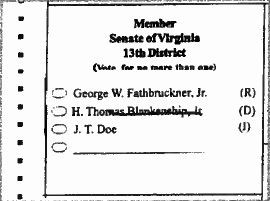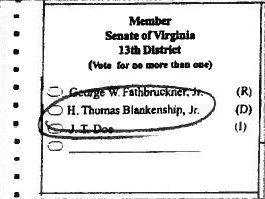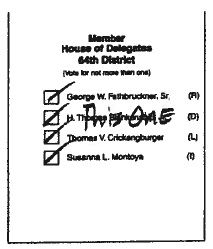 While the iron is hot, there are a few observations that should be taken concerning elections. While paper ballots provide a tangible record, it turns out they are not slam dunk evidence. The cost of optical scan and paper methods is unjustifiable except in distinctly unique cases. DRE is optimal.
While the iron is hot, there are a few observations that should be taken concerning elections. While paper ballots provide a tangible record, it turns out they are not slam dunk evidence. The cost of optical scan and paper methods is unjustifiable except in distinctly unique cases. DRE is optimal.
The Direct Recording Electronic (DRE) method of casting and recording ballots removes subjectivity. There is natural discomfort with a black box recording and storing election results but that is not reason to challenge the reliability of this method. Something on the order of 75% of Virginia jurisdictions use DRE. There is not one case of an election being challenged because DRE was the balloting medium.
- Three things that stand out in the Attorney General recount:
- Virginia elections are reliably supervised and adjudicated
- Paper ballots in any form invite error
- Marc Elias is one cool operator
Why is paper less reliable? Here is an example of a marked paper ballot. The standard published by the Virginia State Board of Elections (SBE) requires a positive affirmation in order to count a vote. According to SBE, this mark is a strike-through; negative. But did the voter really intend an underline making it an affirmation? You’d have to channel the voter’s intent. That’s no way to determine election outcomes.
 How about this one? The SBE standard says that it cannot be counted. Clearly the voter’s mark includes all or part of all three candidates’ names. However, the case can be argued that Blankenship is the only name fully inside the mark. So far, both of these examples, though provided as examples of ballots not to be counted by the SBE itself, would have likely been challenged and required a call by the Recount Court. When elections end up in court, bad things can happen.
How about this one? The SBE standard says that it cannot be counted. Clearly the voter’s mark includes all or part of all three candidates’ names. However, the case can be argued that Blankenship is the only name fully inside the mark. So far, both of these examples, though provided as examples of ballots not to be counted by the SBE itself, would have likely been challenged and required a call by the Recount Court. When elections end up in court, bad things can happen.
So it is easy to see how the undervotes, and possibly overvotes may or may not be counted on election day or during the recount and how the tally can change. Frankly there is an issue of training involved here too. When you do this once a year or less, you might not remember the finer points of the SBE standard. I spoke with an election official who did not count an optical scan ballot undervote on election day where the voter filled in only the “D” next to Mark Herring’s name. This was a Democrat who erred on the side compensating for personal preference. The ballot ended up counting for Herring with only a moment of hesitation during the recount.
There are a lot of other factors affecting the paper vote on election day. I remember the first ballot I ever saw. It was a Louisiana ballot in the ’60s when literacy was a greater issue. But the voters knew the symbols of the parties and at that time the Louisiana Democratic Party featured a rooster. (I’m sorry, but I don’t recall the Republican symbol from that ballot though probably because it was the usual elephant.) Voters all have their idiosyncrasies. You can imagine how hard it might be for a strict partisan to vote for a candidate with that “D” or “R” next to the name. Alternatively, they might feel better about writing in the name alone. Or, they just think they are getting their tax dollars’ worth if they make someone serve them. But in Virginia, if you write in a name that is on the ballot it does not count. That is not a priori knowledge.
 So here is an overvote that the SBE says counts. Every candidate is “affirmed” on this ballot, but one, I suppose, is more affirmed than the others. But one might argue that “This One” is meant to apply to the candidate whose mark in the box points to “This One” rather than the candidate whose name the words obscure. You see, what you see is affected by where you stand.
So here is an overvote that the SBE says counts. Every candidate is “affirmed” on this ballot, but one, I suppose, is more affirmed than the others. But one might argue that “This One” is meant to apply to the candidate whose mark in the box points to “This One” rather than the candidate whose name the words obscure. You see, what you see is affected by where you stand.
And that affected the approach taken by Obenshain’s legal team before the Recount Court. They knew well that the likelihood that the outcome would be reversed was rather low. Their only hope was that somehow they could call the recount outcome into question.
- What Obenshain’s legal team wanted:
- Allow party observers to challenge ballots, generating controversy
- Record the recount on video to document a chaotic climate
- Use the chaotic recount to justify an appeal to the General Assembly
If the margin remained narrowly Herring and the perception of chaos during the recount was effectively socialized, Obenshain stood to steal the contest. If the margin reversed to narrowly Obenshain, he would have no objection to a Herring appeal to the General Assembly on the same grounds. It was a great strategy, but the Recount Court blocked it. Then it turned out the voters completely trumped it.
We ought to never have come to such a precipice. I understand the theories behind the objections to DRE ballots. But I also understand that there are ways to protect the vote against nefarious programmers and their conspiratorial benefactors. I get it that internet over power lines could be used to reach the machines. But I am confident that all of that can be defended against. That is why I now believe that DRE is the most reliable method of ensuring the integrity of elections. (By the way, though not advertised and not allowed by the SBE, DRE machines can generate paper ballots as a record of votes.)
Further, DRE streamlines the process, providing election results on time, potentially every time. It can be used for absentee in person voters. It does not yet eliminate the requirement for paper ballots, though those should all be optical scan ballots. And the largest potential block of absentees, military and government personnel, would be better served with an online voter authorization process.
Allow me to conclude with this. I walk away from my participation in the Virginia election recount process with a renewed confidence in the integrity of the process and those involved. I am also infuriated by each and every attempt to discredit the process by citing rare and exceptional instances of voter malfeasance, intentional and unintentional. Having actually served this country in places where elections are a disgrace, I know that these claims are an absolute insult to each and every American. Those miscreants who attempt to discredit our elections are pathetic and unpatriotic.


 Sign up for the Blue Virginia weekly newsletter
Sign up for the Blue Virginia weekly newsletter
![Tuesday News: “For Biden, Aid Package Provides Welcome Boost on the World Stage”; Biden the Big Winner of This Congress; “A potential reckoning [Trump’s] spent a lifetime eluding could be coming.”; Abigail Spanberger Will Be the Dems’ 2025 VA Gov Nominee](https://bluevirginia.us/wp-content/uploads/2024/04/bidenbigwinner-238x178.jpg)








